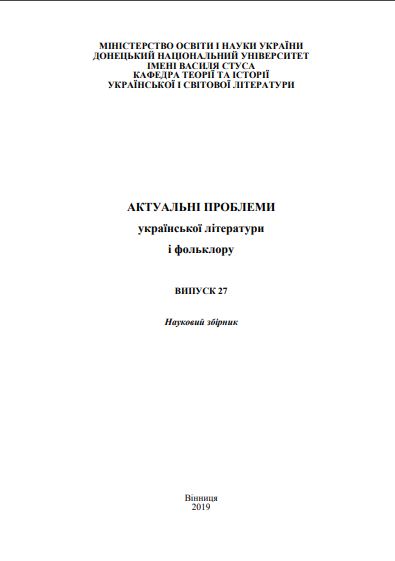Thе Image of an Infernal Machine and the Character of Cast Iron Сommander in the Novel “Donna Anna” by Hordiy Brasiuk.
DOI:
https://doi.org/10.31558/2308-1902.2019.27.2Keywords:
modernism, novel, image of infernal machine, Don Juan, Commander, BrasiukAbstract
«Donna Anna» (1929) by Hordiy Brasiuk (the representative of Executed Renaissance) is virtually unexamined novel. Therefore, in the article, the novel is analyzed in the aspect of the semantics of the infernal machine and through the conflict between two outlooks of male opponents – the apologist of the industry, the engineer-inventor and the servant of Muses, the composer and the musician. It has been defined that besides the problems of sex, love, desire, marital morality and betrayal presented in the novel, one more clearly stands out – the collision of two types of creativity, two approaches to it. These types are embodied by male heroes – man of action, Homo faber, engineer Nick Bachinsky (Cast Iron Commander) on the one hand and man of art and theatrical bohemian, Homo ludens, composer Volodymyr Shalvia (embodiment of musical element and freedom of passion, Don Juan) from another. The first type represents the avant-garde hero – the newest iron god, the conqueror of energy and the earth's interior (the sociocultural type of proletkult and futurism). The second is a type of modernist hero-artist, relativist, and immoralist. And the image of the infernal machine – the invention that destroys its inventor – plays a leading part in solving such an ideological confrontation. Thus, numerous sound, color and pyrotechnical details in the description of the infernal machine in action, as well as the expressive reaction of the viewers and the imaginary death of the engineer are preceded by a plot and are semantically related to the episode of default – the death of the inventor during the experiment. This scene of machine in action seems to suggest the fate of the newest Commander in the epoch of iron cast. In the end, life defeat is experienced by each of the representatives of the outlined love triangle. The Cast Iron Commander perished by his own invention (even if it happened with direct participation of Don Juan), his invention is seized to others, and his cast-iron figure arises like mute reproach only to his former wife, and he is unable to punish the main abuser. Freedomloving Don Juan becomes a mere vegetable as if paying for the combination of genius and crime in his own person. And soon he completely loses his creative inspiration after that, as Anna destroyed his opera, and Talya made an abortion. Donna Anna is crestfallen, reconciling to the role of the cook.References
Брасюк Г. Донна Анна: роман. Київ : Сяйво, 1929. 300 с.

